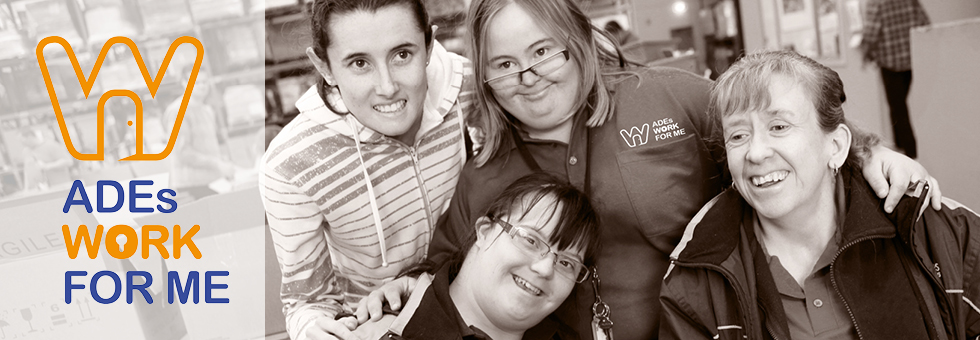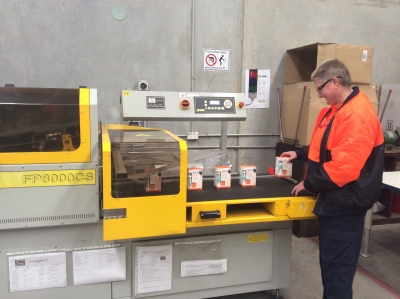Upon leaving school my daughter(Annette) tried very hard through agencies to obtain open employment over a fifteen year period. She struggled with transport to the places of employment and each job was short lived because she had difficulty with her disability to manage the work. In desperation she commenced working for a ADE in the local area. She changed from being downtrodden to someone who was of value. She made new friends and enjoys every minute of her work day. Life now has meaning and purpose.
Heather Nobbs
I had never expected my daughter Lexi to be able to get into an ADE – but now, after almost four years, I can't imagine her not being there.
Lexi, 23, has almost no speech, although she certainly can communicate! She's a social butterfly, in fact. She loves working at ausdesigns in Yarrawonga, outside Darwin, which does screen printing with Indigenous designs of products like conference bags, aprons, coasters and napkins, as well as other tasks like tagging products, paper-shredding and sorting of items like nuts and bolts. Ausdesigns grades the job types according to skill levels. Lexi can't do all of the tasks, but she really enjoys the work she is able to participate in. She attends ausdesigns two days a week (they don't have more places available), and goes to a life skills program for the other three days.
Lexi and all people with disabilities are entitled to the same expectations and have the same right to work the rest of us take for granted. People with disabilities benefit hugely from being treated as valued members of society, who are able to work and give back to the community. In Lexi's case, there really are no other support options for her.
Meghan Williams
If it was not for the Disability Enterprise I would not be working! Left with no income, a mortgage and with no longer any prospect of working in main stream employment, due to a slow degenerative disease, I found myself too young to retire and too old to be employed. At forty two I tried retraining in a different fields gaining further skills, certificates, qualifications, experience hoping employers would look past this disease, it did not matter I was not wanted. Now I am fifty six and a Disability Enterprise employee, the door of hope, rebuilding of self worth and person respect has been opened for me again. I have been able to use and share the skills of gained over thirty years. Thanks.
Greg Nicolson
Our son Ryan, “Mr Champion”, had a difficult start to life with autism, his younger brother and sister and indeed the extended family and the wonderful education placements he has had have all helped him become a settled, confident and energetic young man. Following a very supportive College experience Ryan was encouraged to try working at an ADE, we met with Oak Tasmania and Ryan now works a very happy total of 3 days per week at their Walkabout Industries and Tahune Fields Nursery businesses. Oak provides a great working environment for people like Ryan who may not always need a close and constant supervision but there is an “ever present support” enabling them to perform meaningful work and gain a sense of achievement and fulfilment.
ADEs like Oak Tasmania allow a significant number of people to join the workforce and reach their full potential, this is good for the individual, good for families and good for Australia, so it is vital that these businesses are themselves supported and allowed to continue their important role in society.
Michael Rutledge
I am a 54 female who is currently working in an ADE .I also take care of my brother who until last year was also part of the same organisation. This organisation threw me a life line. My brother started at Thorndale in 1984. He learnt new motor skills and how to be part of a team . He was always eager to go to work and like myself enjoyed the social aspect. I had worked in the manufacturing industry making shoes until 2000 when my health declined . Four years ago I began work at ADE and it is the best thing that has happened to me in so many way's . I was at a point where I thought I would not be in the workforce again. It gives me a sense of worth. I am a very independent person and did not like being out of the workforce, but I did not have much choice.
Working for an ADE is very important not just to me, but each and every person who attends Thorndale. ADE give us support including life skills. I had never had a holiday ,but always had the dream of going to America and I truly believe that I gained the confidence and believed in myself enough to actually go. I see fellow workers coming through ADE and it's great to see that some, especially younger people making the transition very rewarding. I feel very proud and thankful to be a part of this
Karen Ferrier
I enjoy going to Thorndale to work with great friends, meeting new people as well as meeting clients for the moving crew. Going to difference places and learning to use different equipment. I enjoy the challenge of using different equipment like the big ride on mower to the whipper snipper. Also being given the challenge of the only girl in the mowing crew. I have also been given the responsibility of driving the work vehicles and trailers and learning how to reverse the trailer.
It is great to be able to talk about footy and having different friends who go in different teams is also fun. Working at a Disability Enterprise is definitely something that I would recommend to anyone who needs some support at work
Fiona Hinchcliffe
My son Tony was born with an intellectual disability. He has a brother and two sisters. He attended special school and then our local business service, so he could "go to work" like his dad and siblings. It was never about the money, more about the social activities, self-esteem and mates - with extra cash to spend as he liked. It was his pay packet – he had worked for it. He'd draw out his $20 each week from the ATM. Not enough, some might say, but he was happy deciding how to spend it.
Tony's pension never covered his needs; family made up the shortfall. He didn't understand money, but knew you needed it to buy things. Tony's job was moulded around his ever changing needs – no easy task. As he aged, Tony had to leave his "job". He never regained his "I'm working" self-esteem, so we visited the business service regularly. He passed away aged 38 and, on reflection, those years at the business service were the happiest of his life. I still visit often, to be met with lots of hugs, and smiles by happy workers. To the new workers, I'm "Tony's mum". We must unite to save this work option for all the Tonys of this world.
Mary Walsh
My twin sons, Robert and Stephen, 25, work at DSA at Braemar. When the boys were in year 12, transition to work (TTW) organisations began spruiking to us, and they started doing process work at DSA after completing TTW in 2008. It keeps them busy for four days a week, and it's flexible and varied. If we have a medical appointment or want to go on holiday, DSA is accommodating. The disability support pension is my sons' main income, so if they take leave without pay, it makes little difference to their finances. The downsides are that some work may be unpleasant and their interaction with other workers can lead to anxiety and temper tantrums at home. But otherwise they would want to continually buy old electrical items on eBay, which frustrates them when things don't work as they expect.
If anything happened to DSA, we would have to try to arrange other work through Disability Employment Services, which would likely not be so suitable. In general, if ADEs had to close there would be a lot of people looking for work, competing with people who don't have disability. What's more, businesses would find it hard to source alternative places to get process-type work done at a reasonable cost.
Frank Sehlmeier
My son Matthew, 29, was involved in a Living Skills Programs but was frustrated at the lack of structure and routine. We had one disastrous attempt at open employment, which Matt wasn't ready for. Then, about six years ago, we discovered our ADE, Wallara Industries, through a friend of mine who worked there. I was surprised and excited about the opportunities available to him. I also liked the attitude of the ADE staff and support available not only to Matt but also to me as a parent.
He has now gone from working on the assembly line, picking and packing, supervising, receipting orders coming into the warehouse, to now being their main forklift driver and also training for his truck licence. He has achieved a Certificate 2 in Warehousing – his days are full and his confidence and self-esteem are high. He loves getting his payslip! But just as important are his development of a strong work ethic and the connection with his peers, which has led to outside activities such as tenpin bowling and the Special Olympics. He truly bounds out of bed in the morning to head off to work and then loves coming home and discussing his day with me. In our area there would not be anything else suitable for the skill level that he has now achieved and what he would expect to do.
Vicki Smith
Sammy’s contribution valuable experience in administration at St Mary’s office
Sammy Paciente has been undertaking work experience in administration and office work at our factory at St Mary’s as a part of the Sunnyfield Transition to Work program. Sammy has been learning valuable skills in filing and archiving and will shortly assist with a new project to help the office become more environmentally friendly and reduce its paper filing system. Sammy reports that she loves working at the office in St Mary's and has decided that this is a vocational pathway that she would like to continue further. Sammy has been given valuable training and assistance by the Manager of Respite Services, Janet Hunter who has reported that Sammy is making a valuable contribution and providing much needed administrative assistance at the St Mary’s office.










